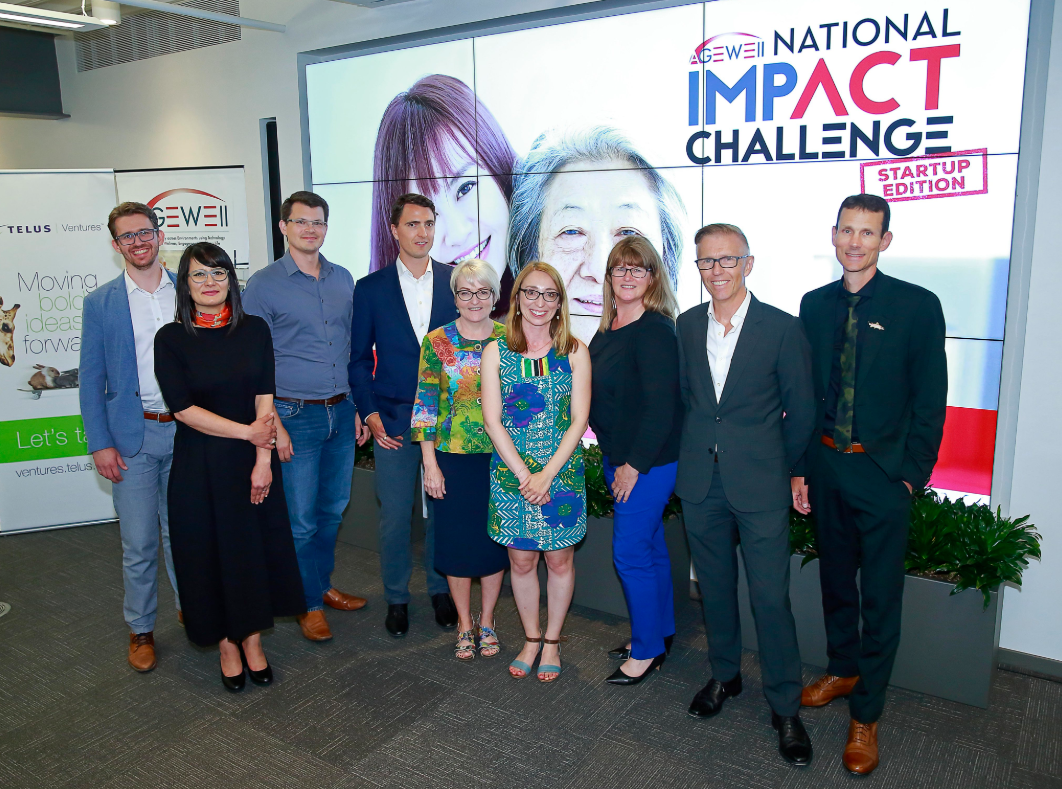
The $15,000 prize won by Gabriela Constantinescu and her team will go towards supporting True Angle Medical Technologies' next clinical trials that will validate their system in patients with a history of stroke. (Photo: AGE-WELL)
First off, congratulations on winning top prize! So tell us, what exactly is the AGE-WELL competition and how did you find out about it?
AGE-WELL is Canada's Technology and Aging Network. They are a pan-Canadian network that brings together people from different sectors: researchers, commercial enterprises, community organizations, consumers and others. Their goal is to accelerate the development of technology-based solutions for healthy aging and aging with dignity.
Someone passed on the call for the AGE-WELL National Impact Challenge - Start-up Edition to our CTO, Dylan Scott, who took the lead in putting the written application together. Five finalists were selected in three regions across Canada to make their pitch. I went to Vancouver to represent our team there for the final pitch.
How did you prepare for the competition?
Our team, including University of Alberta Faculty of Rehabilitation Medicine's Jana Rieger and Faculty of Engineering graduate Dylan Scott, was fortunate enough to have been a part of the Creative Destruction Lab - Rockies this year. This program and the mentorship we received there helped us build value in our start-up, fine-tune and practice our pitch, as well as be prepared to answer questions from judges and investors.
Aside from that, I wrote my lines and rehearsed them on my flight there and in my hotel room!
Can you tell us a bit more about Mobili-T, the technology that contributed to your win?
Mobili-T is short for Mobile Therapy. Mobili-T takes information regarding muscle activity from swallowing muscles under the chin and displays that information to patients on a smartphone app in the form of biofeedback. In other words, Mobili-T uses surface electromyography (sEMG) sensors to let patients know what their muscles are doing during exercise. Clinicians can remotely monitor progress, adherence, and adjust prescriptions.
How is Mobili-T helping the aging population?
Mobili-T is a unique system, which provides equitable access to therapy for patients with swallowing difficulties. Mobili-T allows patients to reliably complete their prescribed intensive therapy regimens on a daily basis, from the comfort of their own home. Swallowing difficulties, or dysphagia, affects 250 million people around the world each year. In North America, we know that dysphagia affects about 20 per cent of those over the age of 55 and that half a million people are admitted to the hospital each year because of difficulties swallowing. The side effects of dysphagia, such as malnutrition, dehydration, aspiration pneumonia and complications from having a feeding tube, cost the healthcare system more than 17 billion dollars to manage. Effective therapies do exist, but access to them is limited or non-existent.
True Angle Medical Technologies (TAMT) is the company that you and your team mates were competing as, correct? Are there any other up and coming technologies you're working on that will be beneficial to certain populations?
Yes, that's correct. We are currently working on a few different form factors for sensing technologies.
What kind of technologies does TAMT work on?
We are a sensor company. Mobili-T happens to be our first product. Our goal is to take therapy outside of the clinic and bring it to the patient.
How did you feel when you found out you won?
I was pretty excited. The competition was strong, with a few great innovations and ambitious start-ups.
What does this win mean for Mobili-T and TAMT? What will the prize go toward?
The $15,000 will go towards supporting our next clinical trials that will validate our system in patients with a history of stroke. We will be working with the Glenrose Rehabilitation Hospital on these trials. The mentorship and access to the AGE-WELL networks will be invaluable in the next steps towards commercialization and spreading the word. All in all, this win brings us one step closer to putting this technology in the hands of our patients.